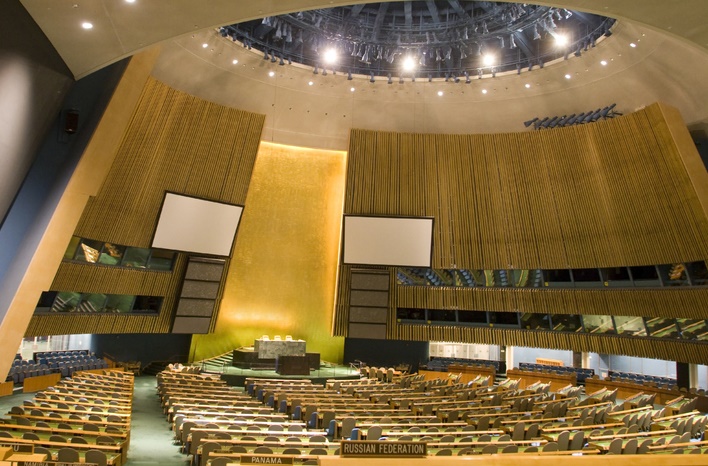Given the COVID-19 pandemic, this year’s United Nations High-Level Political Forum (HLPF) was drastically different, necessitating a virtual platform as hundreds of governments, NGOs, and civil society tuned in remotely to side-events rather than congregating at the UN headquarters in New York. Despite the challenges of a remote HLPF, USCIB retained its active leadership role, co-organizing side-events on inclusive multilateralism, the private sector’s role in educating the public about vaccines, and partnerships to fight COVID-19 and to advance the UN 2030 Development Agenda.
Inclusive Multilateralism
USCIB kicked off the week with a side-event on “Inclusive Multilateralism in Action: Working Together to Build Stronger, Resilient and Sustainable Economies” on July 7. USCIB, which serves as co-chair of the UN’s Business and Industry Major Group, partnered with the International Organization of Employers (IOE), the UN Global Compact, the International Chamber of Commerce (ICC) and the American Chemistry Council on the event. Dialogue among experts during the panels highlighted synergies at the national and global levels of COVID-19 response and recovery with the Sustainable Development Goals (SDGs) and made the case of mainstreaming private sector partnership and expertise into the UN Decade of Action and Delivery.
The USCIB Foundation’s Business Partners for Sustainable Development (BPSD) Initiative Executive Director Dr. Scott Ratzan spoke on one of the panels alongside, First Vice Chair of the International Chamber of Commerce (ICC) Maria Fernanda Garza, Secretary General, International Organization of Employers (IOE) Roberto Suarez Santos and UN Global Compact Executive Director Sanda Ojiambo. USCIB Vice President for International Strategic Engagement, Energy and Environment Norine Kennedy moderated a panel which explored best practices from business in developing partnerships to address food security, health and waste management challenges, all of which have become more difficult for the global community to tackle in light of COVID-19.
“The presentations highlighted the role of business as ‘first responders’ in several key areas of the pandemic response,” said Kennedy. In concluding the panel, Kennedy summed up what is needed as businesses merge their SDG plans with crisis response and recovery: “Inclusive multilateralism involving and mainstreaming private sector dialogue and implementation is not a nice-to-have; it is a must-have for a successful UN Decade of Delivery, Action and Recovery.”
Partnerships
BPSD was also featured at a July 7 side-event organized by the UN 2030 Agenda Partnership Accelerator. Titled “Partnerships against COVID-19 – building back better together to advance the 2030 Agenda,” the event explored how partnerships can assist developing countries in addressing challenges of the coronavirus and its aftermath while promoting synergies between key sectors, such as the scientific and technological community and the private sector. Ratzan, representing BPSD, joined a select group of experts including Sustainable Development Officer, Division for Sustainable Development Goals, UN DESA Ola Goransson, Resident Coordinator, Mauritius and Seychelles Christine N. Umutoni and Professor and Department Chair of Development Sociology, Cornell University, member of the Independent Group of Scientists for the Global Sustainable Development Report Parfait Eloundou-Enyegue.
Scientific Advances and Vaccination Acceptance
BPSD, together with the UN Technology Facilitation Mechanism, UN Department of Economic and Social Affairs (DESA), and City University of New York (CUNY) Graduate School of Public Health and Health Policy organized “COVID-19 vaccines: scientific advances, access models and vaccination acceptance,” on July 10 to explore the status of scientific research advances, implications for policy, and generating public trust in science and building vaccine literacy, and addressing misleading vaccine information.
“Despite the major technological advances that have enlisted industry to fast track a COVID-19 vaccine, all these efforts will be for nought if not enough people accept a vaccine to reach the necessary community protection, also termed herd immunity,” warned Ratzan. “Vaccine hesitancy threatens uptake for a COVID-19 vaccine before it has even been developed. Anti-vaccination advocates are spreading disinformation and inciting fears including vaccine side effects, safety and/or efficacy. Compounding these ongoing issues is a reality in which globally, many do not believe COVID-19 is a real threat. While we are not sure how entrenched these groups are in their disbelief of the risks of coronavirus infection or believe the pandemic is a conspiracy, there is much work to do to build vaccine literacy and combat a pervasive anti-science, anti-truth rhetoric.”
Ratzan also presented “The CONVINCE Initiative” (COVID-19 New Vaccine Information, Communication, and Engagement), which will bring together key players in a multisectoral collaboration to formulate a whole-of-society approach to create frameworks, best practices and platforms to ensure vaccine uptake.
